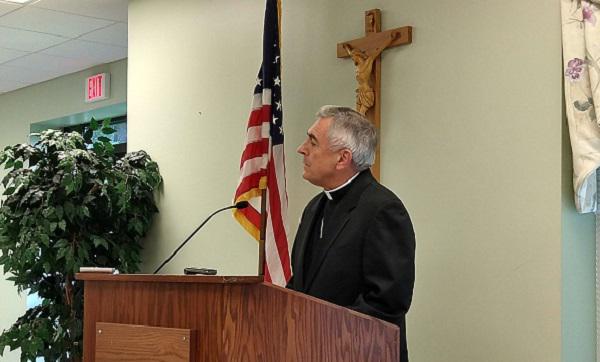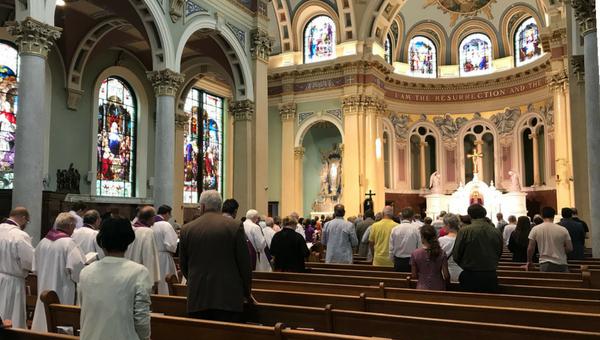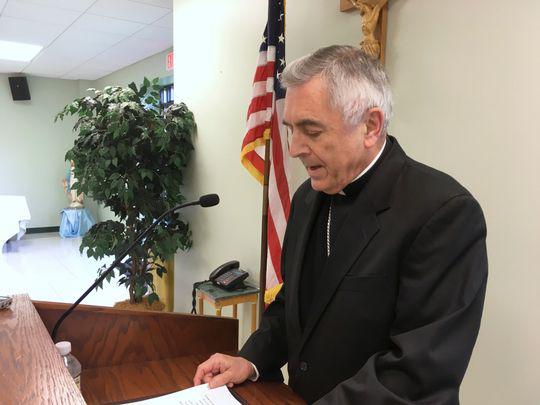|
Bishop Gainer has talked about transparency. How's his record?
By Ed Mahon
Bishop Ronald W. Gainer has talked about "the healing touch of transparency." But a review of his record as the head of the Harrisburg, Pennsylvania, diocese offers a complicated portrait. Terry McKiernan, president of BishopAccountability.org, said recent revelations and actions show that Gainer isn't living up to his promises of transparency as the leader of the Harrisburg diocese. For instance:
"Not only is transparency not his priority, which is bad enough," McKiernan said, "but he's pretending it is." Gainer and the diocese have defended his record. In a statement, provided by spokeswoman Rachel Bryson on Wednesday, the diocese said:
Gainer wasn't singled out for praise as the bishop of Erie was during Attorney General Josh Shapiro's Aug. 14 news conference. But he hasn't received the volume of criticism as other religious leaders.
Here's a look at his record. 2014 letters
Gainer, now 71, was born in Pennsylvania and ordained a priest in the Allentown diocese. In 2003, he was installed as the bishop of Lexington in Kentucky. McKiernan, with BishopAccountability.org, sees the action Gainer took in that Pease case as an attempt "to keep the Pease story quiet." The Pease case began many years earlier. There were multiple allegations against him. That includes the allegations of a man who, in 1995, came forward and told the diocese that Pease had sexually abused him years earlier when he was between 13 and 15 years old. The man said Pease fondled him and performed oral sex on him. In September 2002, there was another allegation against Pease -- this one going back to about 1972 -- and Pease retired from active ministry. Following a December 2002 announcement from then-Bishop Nicholas Dattilo that Pease had admitted to "inappropriate sexual contact with an adolescent," three other victims came forward, the grand jury report said. The grand jury report described Pease as part of "a group of predators who shared information regarding their victims and utilized that intelligence to share victims between each other." By 2014, Pease wasn't in active ministry anymore. But there had been no final determination over whether he should remain a suspended priest or be removed from the priesthood, according to the grand jury report. In September 2014, Gainer wrote a letter to the Vatican regarding Pease, stating that the "scandal caused by his admission of the sexual abuse of a minor has been sufficiently repaired .... ." He asked for the Vatican to allow Pease "to live out his life peacefully, in prayer and penance, recognizing the harm he has caused in the lives of others, and making amends for it." The grand jury criticized Gainer over that letter. "While removing Pease from ministry was a start, he was clearly unfit to carry the title of priest," the grand jury report stated. "Moreover, public knowledge of Pease's crime is exactly what was required in service to the public and Pease's victim." Gainer wrote a similar letter for James Beeman, who left active ministry in the early 1990s after he was accused of sexual abuse, including that he raped a 7-year-old girl while she was in the hospital to have her tonsils removed. The diocese has defended Gainer. On Aug. 15, it put out a statement, stating that there was no cover-up and that Pease and Beeman had been reported to law enforcement many years earlier. The diocese said a canonical trial to remove Pease and Beeman from the priesthood wasn't feasible at that point because they were old and infirm. The diocese said Pease was 83 years old and "suffering from diminished mental capacity," while Beeman was 88 years old "and in declining health." Beeman died in 2016. Gainer's intention was to ensure that Beeman and Pease remained barred from presenting themselves as priests, conducting ministry, or dressing as priests, the diocese said, adding that the form letter he used "is regrettably not written well and does not accurately represent the action that was taken." In its Wednesday statement to the YDR, the diocese said, "It is important to note that both of these cases festered in the Diocese for many years until Bishop Gainer acted to resolve them." Resistance to statewide grand jury investigationIn 2017, the Harrisburg and Greensburg dioceses attempted to shut down the statewide grand jury investigation into sexual abuse by priests, the Pittsburgh Post-Gazette and The Philadelphia Inquirer reported in June, citing recently unsealed court records. Gainer isn't mentioned by name in the story, but he was the head of the Harrisburg diocese at the time. Shapiro criticized the Greensburg and Harrisburg dioceses during a recent interview with The New York Times, saying despite public statements to the contrary, at least two bishops "were working behind the scenes to shut the report down." Shapiro added: "There were all kinds of efforts being led by our opponents within the church, and supporters of the church, really powerful lobbyists and lawyers who would file all kinds of motions -- which, again, I think a lot of that I still can't speak about -- or take certain steps to either derail our investigation or shut it down." In its statement to the YDR, the diocese said it always cooperated with the investigation and supported the release of a report but wanted the investigations done by local district attorneys. "Our attorneys raised this issue of jurisdiction only to ensure that if charges were brought by law enforcement against individuals they could be prosecuted with the full weight and authority of the law," the diocese said. In the end, the supervising judge ruled that the investigation could remain with the attorney general's office and that the attorney general's office could always refer its findings to local district attorneys for prosecution, according to the Inquirer and Post-Gazette. The Survivors Network of those Abused by Priests said the attorney general's office report "established the benchmark that should be followed in all other investigations." The group has called for similar statewide investigations in every state. Grand jury recommendationsAt his Aug. 14 news conference, Shapiro issued a challenge to church leaders. "They claim to have changed their ways. They claim to have put appropriate safeguards in place and no longer have tolerance for sexual abuse of any kind," Shapiro said. "Statements are one thing. The proof of their claims will be if they support each of the four grand jury recommendations." Those recommendations are to:
In an interview with abc27, following the release of the grand jury report, Gainer said the diocese had already waived confidentiality agreements for abuse victims and that he didn't have a problem with lifting the statute of limitations for criminal cases. Gainer and the diocese also support clarifying penalties for failure to report child abuse, the diocese said in its statement to the YDR. But one of the recommendations -- dealing with the statute of limitations for civil cases -- has been a point of contention for years. The Pennsylvania Catholic Conference has opposedretroactive changes to the state's statute of limitations for civil cases. Senate President Pro Tempore Joe Scarnati, a Republican, has said that a retroactive change to the statute of limitations would be unconstitutional. He suggested other measures to strengthen child sexual abuse laws, and he said the church needs to establish a victim support fund to make restitution to its victims. In a statement Aug. 30, the Harrisburg diocese said it was open to talks regarding the establishment of a fund to assist victims, and the diocese suggested that was a better idea than changing the statute of limitations. "As many in the legislature have determined that a lookback provision to the statute of limitations is unconstitutional, this may be the best path forward to assist survivors," the diocese said. Other bishopsThere are areas where the Harrisburg diocese has been more transparent than it needs to be. The Harrisburg diocese has publicly identified more clergy members accused of abuse than the sweeping statewide grand jury report did. The diocese has named 72 clergy members, while the grand jury report listed 45 offenders from the diocese. And Gainer ordered that no bishop since 1947 should have a diocese building, facility or room named after him. And Gainer hasn't received the same level of criticism as former Pittsburgh Bishop Donald Wuerl, who was accused of allowing the reassignment or reinstatement of priests accused of sexually abusing children. Some people have called on every Catholic bishop to consider resigning "as a public act of repentance and lamentation before God and God's People." But McKiernan, despite his criticism of Gainer, is not calling for this bishop of Harrisburg to step down. If the church replaces Gainer, it would likely bring in somebody "cut from the same cloth," McKiernan said. Instead, McKiernan hopes the recent revelations -- involving Gainer's 2014 letters and the Harrisburg diocese's efforts to stop the statewide grand jury investigation -- could be used as a reason to pressure him into supporting statute of limitations changes.
|
.
Any original material on these pages is copyright © BishopAccountability.org 2004. Reproduce freely with attribution.


